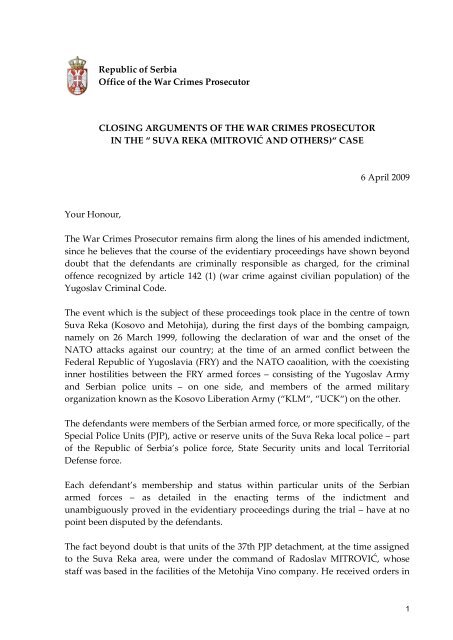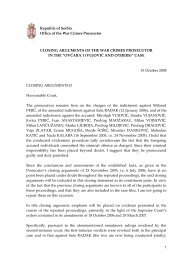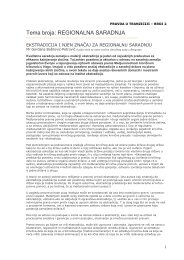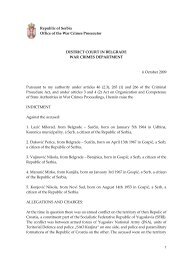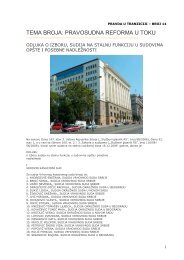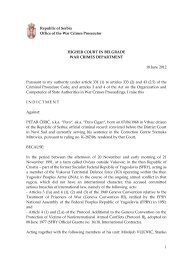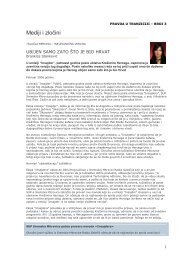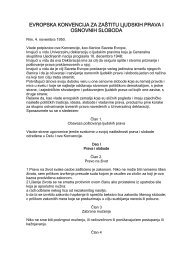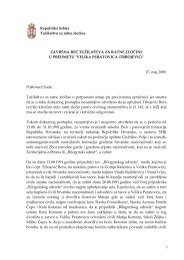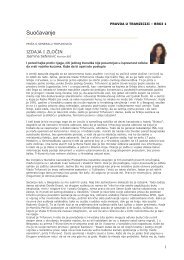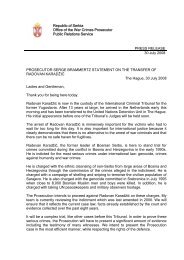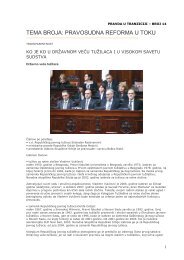SUVA REKA (MITR
SUVA REKA (MITR
SUVA REKA (MITR
Create successful ePaper yourself
Turn your PDF publications into a flip-book with our unique Google optimized e-Paper software.
Republic of Serbia<br />
Office of the War Crimes Prosecutor<br />
CLOSING ARGUMENTS OF THE WAR CRIMES PROSECUTOR<br />
IN THE “ <strong>SUVA</strong> <strong>REKA</strong> (<strong>MITR</strong>OVIĆ AND OTHERS)“ CASE<br />
6 April 2009<br />
Your Honour,<br />
The War Crimes Prosecutor remains firm along the lines of his amended indictment,<br />
since he believes that the course of the evidentiary proceedings have shown beyond<br />
doubt that the defendants are criminally responsible as charged, for the criminal<br />
offence recognized by article 142 (1) (war crime against civilian population) of the<br />
Yugoslav Criminal Code.<br />
The event which is the subject of these proceedings took place in the centre of town<br />
Suva Reka (Kosovo and Metohija), during the first days of the bombing campaign,<br />
namely on 26 March 1999, following the declaration of war and the onset of the<br />
NATO attacks against our country; at the time of an armed conflict between the<br />
Federal Republic of Yugoslavia (FRY) and the NATO caoalition, with the coexisting<br />
inner hostilities between the FRY armed forces – consisting of the Yugoslav Army<br />
and Serbian police units – on one side, and members of the armed military<br />
organization known as the Kosovo Liberation Army (“KLM“, “UCK“) on the other.<br />
The defendants were members of the Serbian armed force, or more specifically, of the<br />
Special Police Units (PJP), active or reserve units of the Suva Reka local police – part<br />
of the Republic of Serbia’s police force, State Security units and local Territorial<br />
Defense force.<br />
Each defendant’s membership and status within particular units of the Serbian<br />
armed forces – as detailed in the enacting terms of the indictment and<br />
unambiguously proved in the evidentiary proceedings during the trial – have at no<br />
point been disputed by the defendants.<br />
The fact beyond doubt is that units of the 37th PJP detachment, at the time assigned<br />
to the Suva Reka area, were under the command of Radoslav <strong>MITR</strong>OVIĆ, whose<br />
staff was based in the facilities of the Metohija Vino company. He received orders in<br />
1
the Priština-based headquarters, whose members, among others, were General<br />
LUKIĆ, Obrad STEVANOVIĆ and Vlastimir ĐORĐEVIĆ.<br />
Furthermore, the official report issued by the Republic of Serbia’s Ministry of the<br />
Interior – Minister’s immediate office, registered under number 017828/058 and<br />
dated 7 July 1999, confirms that the 37th PJP Joint Detachment and 5th Company –<br />
part of the 124th PJP Intervention Brigade - were at the time assigned to the Suva<br />
Reka area, under the overall command of Colonel Radoslav <strong>MITR</strong>OVIĆ.<br />
The results of the evidentiary proceedings, the statement provided by defendant<br />
Radoslav <strong>MITR</strong>OVIĆ and matching that of witness Božidar DELIĆ, as well as a<br />
number of statements given by other army or police members, give grounds to the<br />
following conclusions:<br />
- In the period between 20 and 26 March, i.e. immediately prior to the onset of the<br />
bombing campaign and in the first days thereof, the UCK launched intensive attacks<br />
against army and police units across the Suva Reka area. Specifically, the UCK forces<br />
operating in the region included the 124th, 122nd and 121st Brigades and formations<br />
of local command staffs, which made a total of between 1,500 and 3,000 UCK troops.<br />
- On 20 or 21 March, accompanied by Božidar DELIĆ, the defendant went to Priština<br />
in order to receive documents for the tasks due to be carried out in case the bombing<br />
started. The tasks involved the neutralization of the UCK units deployed inside the<br />
triangle Prizren – Suva Reka – Orahovac and the establishment of communication.<br />
Having received instructions from Priština, <strong>MITR</strong>OVIĆ and DELIĆ immediately<br />
elaborated details of their further activities, and started the realization of their tasks<br />
in the ealy morning of 25 March, by launching an attack on the UCK force in the<br />
Suva Reka area. The attack was carried out by the unit under <strong>MITR</strong>OVIĆ’s<br />
command, with the support of the 549th and 243rd motorized brigades of the<br />
Yugoslav Army.<br />
- In the above described circumstances, Radoslav <strong>MITR</strong>OVIĆ had a dual role as the<br />
commander of the joint PJP detachment and leader of the ongoing offensive<br />
operation, i.e. part of the operation conducted by the joint military and police forces.<br />
The logical conclusion arising from the foregoing facts is that in his capacity as<br />
specified above, Radoslav <strong>MITR</strong>OVIĆ certainly had contacts with the chief of the<br />
local police and with its commander, i.e. asked them for logistic and other support,<br />
as well as for the local police reinforcements in order to carry out the said operation.<br />
The foregoing conclusion is substantiated by the fact that the primary goal of the<br />
operation under his command was to create favourable conditions and<br />
communications with a view to cleansing the area of the UCK presence and placing it<br />
2
under the control of the local law enforcement authorities, i.e. the Suva Reka police.<br />
In terms of military technics and tactics, i.e. according to the rules of military<br />
doctrine, the nature of the operation was such that the forces of the local police,<br />
Territorial Defence and Civil Protection in Suva Reka were part of the joint combat<br />
force within the 37th PJP Detachment. This further means that, by virtue of being an<br />
overall commander of the task, Radoslav <strong>MITR</strong>OVIĆ was also entitled command<br />
over the local police (who were supposed to take control upon the seizure of the<br />
territories), as well as over the Territorial Defence and Civil Protection forces.<br />
Beside such rights and authorities, Radoslav <strong>MITR</strong>OVIĆ, being the commander of<br />
the 37th PJP Detachment and head of the military operation at issue, bears major<br />
moral and any other responsibility. His responsibility, which arises from the<br />
principles of military doctrine and armed combat, and from the rules of military<br />
leadership and command at times of war and peace, covered all developments and<br />
activities of the unit under his command.<br />
The foregoing conclusion is further substantiated by a number of witnesses – former<br />
members of the Suva Reka police force. They all view <strong>MITR</strong>OVIĆ’s role as that of<br />
commander, since they personally observed his relationship with heads of the local<br />
police, who readily carried out orders received from him.<br />
In addition to the above, the Defence Ministry report (ref. VBA – SP 3186-2) of 21<br />
March 2006 specifies that, in the early morning of 25 March 1999, combat group 5<br />
(BG-5) – part of the 549th Motorized Brigade, passed through Suva Reka and<br />
proceeded towards villages Reštane, Studeničane and Samodraža, where they<br />
remained conducting their operations until 27 March 1999. On the said date they<br />
moved off in the direction of Samodraža, Dobrodeljane and Paraguša, where they<br />
continued their operations until 1 April 1999. The report also specifies that in the<br />
aforementioned period the Yugoslav Army did not engage in any military operations<br />
in the Suva Reka area, because the town was controlled by the Republic’s Ministry of<br />
the Interior (MUP). The report thus makes it clear that the VJ forces bear no<br />
responsibility whatsoever for the events that took place in Suva Reka in the period<br />
specified. Likewise, it is clear from the report that no UCK units or individual<br />
members were present inside the town at the time.<br />
The fact beyond doubt is that regular forces of the Suva Reka local police were also<br />
present in the area. Specifically, active members of the police force launched<br />
crackdowns on the UCK, whereas reserve forces were assigned to regular law<br />
enforcement duties, which mostly involved protection of police facilities, operations<br />
of constable services and patrol teams, and other tasks as necessary.<br />
Those units were under the de iure and de facto control of the accused, Radojko<br />
3
REPANOVIĆ, who was the police comander, and his deputy Nenad JOVANOVIĆ<br />
(the latter’s competences included the command over the reserve force). The accused,<br />
Slađan ČUKARIĆ and Miroslav PETKOVIĆ, were members of the Suva Reka local<br />
police; the accused, Milorad NIŠAVIĆ, was the State Security officer in charge of the<br />
Prizren area, whereas the accused, Zoran PETKOVIĆ, was member of the Suva Reka<br />
Territorial Defence force.<br />
On 26 March 1999, from 12:00 hrs onwards, all of the herein accused individuals<br />
engaged in the acts as detailed in the enacting terms of the indictment, including<br />
attacks on civilian persons and buildings in the part of Suva Reka called Reštanski<br />
Put. In the aftermath of the said attacks, fifty civilians – mostly women and children<br />
from the BERISHA family – were killed, almost all houses in the attacked part of the<br />
town were set on fire and burnt down, whereas the local population was robbed of<br />
their possessions. The overall campaign resulted in a mass exodus of local Albanians<br />
from the town.<br />
Numerous witnesses heard throughout the evidentiary proceedings – including<br />
ethnic Albanian civilians, witness A, witness VELJKOVIĆ and others – have<br />
unambiguously confirmed the following facts:<br />
- On 26 March 1999 at around 12:00 hrs, two trucks loaded with members of the 37th<br />
PJP Detachment, and a landrover carrying the accused, <strong>MITR</strong>OVIĆ, arrived in front<br />
of the local police station in Suva Reka. Having got off the trucks, the attackers split<br />
into smaller groups headed towards the road called Reštanski Put. As they moved<br />
along the road, they forcibly entered the BERISHA family houses on the left and<br />
right, which they searched and set on fire.<br />
- Concurrently standing outside the police station building were several active and<br />
reserve members of the Suva Reka police force, as well as Milorad NIŠAVIĆ, who<br />
was a member of the then Republic’s State Security.<br />
- In front of the police station building, the accused, <strong>MITR</strong>OVIĆ, ordered<br />
REPANOVIĆ’s deputy Nenad JOVANOVIĆ that the group of the Suva Reka police<br />
members – whom REPANOVIĆ had previously assigned to the task and placed<br />
under JOVANOVIĆ’s control – join the operation, saying: “Come on, what are you<br />
waiting for... or you perhaps expect me to do that instead of you!“<br />
- Slađan ČUKARIĆ took a detainee named Abdulah ESHLANI out of the Suva Reka<br />
police station building, whereupon he deprived the victim of life with a gunshot<br />
from his automatic rifle.<br />
- The accused, JOVANOVIĆ, passed <strong>MITR</strong>OVIČ’s order to the said police unit,<br />
instructing them to join the still unidentified members of the 37th PJP Detachment,<br />
4
who had already started the terrain cleansing operation by attacking homes at the<br />
site called Reštanski Put. In subsequence, JOVANOVIĆ personally took part in the<br />
operation by joining the unit which was composed of active and reserve police<br />
members, including the accused: Slađan ČUKARIĆ, Miroslav PETKOVIĆ, Milorad<br />
NIŠAVIĆ and Zoran PETKOVIĆ, along with Radovan TANOVIĆ (now deceased),<br />
witness “A“, and several other – still unidentified – local police and Territorial<br />
Defence members.<br />
- Thus, Slađan ČUKARIĆ and Miroslav PETKOVIĆ – in a joint and synchronised<br />
campaign with a number of other individuals, including the now deceased local<br />
police member Radovan TANOVIĆ, State Security officer Milorad NIŠAVIĆ,<br />
Territorial Defence member Zoran PETKOVIĆ, as well as a number of other<br />
unidentified members of the local police, Territorial defence, State Security and 37th<br />
PJP Detachment – consciously and wilfully engaged in the execution of the received<br />
order.<br />
Armed with their personal weapons, they left the local police station courtyard and<br />
headed towards Reštanski Put, in order to raid the homes of Albanians who were not<br />
participating in the hostilities. They removed the innocent civilians from their homes,<br />
which they subsequently searched, plundered and burnt; as they did so, they killed<br />
some of the occupants on the spot, and held others at gunpoint while directing them<br />
towards and inside the local trading centre, where, after a certain while, almost all of<br />
them were killed.<br />
In his dual capacity as commander of the 37th PJP Detachment and of the operation<br />
charged, the accused, <strong>MITR</strong>OVIĆ, bears major command, moral and any other<br />
responsibility for developments in the zone of responsibility controlled by his unit.<br />
Likewise, apart from the crime which involved the attacks on, and the killing of the<br />
civilians as described, he bears full responsibility for all other crimes that occurred in<br />
his zone of responsibility.<br />
In addition to the above, <strong>MITR</strong>OVIĆ is responsible for the acts of his subordinates –<br />
members of the unit under his control – who searched and burnt the local Albanians’<br />
family homes in Suva Reka. Specifically, according to the testimonies offered by a<br />
number of eyewitnesses, they burnt two or three houses opposite the police station<br />
building, several houses situated along the earth section of the road called Reštanski<br />
Put, as well as several others on its main section – namely the houses owned by<br />
Faton, Nexhad and Vesell BERISHA; furthermore, they set on fire and destroyed the<br />
local trading centre and pizza restaurant, as detailed by the accused: Miroslav<br />
PETKOVIĆ and Nenad JOVANOVIĆ, by witnesses “A“, Shirete BERISHA, Violca<br />
BERISHA, Ljubiša GOGIĆ, Velibor VELJKOVIĆ, and almost all other witnesses who<br />
were present at the crime scene and personally saw the remains of the burnt-down<br />
structures.<br />
5
The accused, <strong>MITR</strong>OVIĆ, is additionally responsible for failing to prevent his<br />
subordinates from plundering a spare car parts store situated in the immediate<br />
vicinity of the BERISHA family home, whose members were forced outside their<br />
home and taken to the pizza restaurant, where they were held confined. While some<br />
members of his unit engaged in the killing of the captives locked inside the<br />
restaurant, others were busy loading a PJP truck with goods plundered from the<br />
spare car parts store until it remained completely empty, whereupon the loot was<br />
driven away... The foregoing facts have been confirmed by witnesses Agron<br />
BERISHA and “A“, as well as by the accused, Miroslav PETKOVIĆ.<br />
The accused, <strong>MITR</strong>OVIĆ, is also responsible for failing to punish the perpetrators of<br />
the above described crimes. Likewise, he failed to make a report on the event at issue<br />
and notify the Kosovo Police Headquarters thereof.<br />
The accused, <strong>MITR</strong>OVIĆ, claims in his submission that he did not order attacks on<br />
civilians and that he was unaware of the fact that the attack had been launched.<br />
<strong>MITR</strong>OVIĆ further claims that on 26 March 1999 he was not at all present at the<br />
scene, and goes on to explain that on the said day he was in Prizren, visiting a<br />
wounded member of his detachment and arranging his transport by helicopter to the<br />
Military Medical Academy (VMA) in Belgrade. Finally, he specifies that he remained<br />
in Prizren until about 13:00 hrs, when the helicopter with the wounded took off and<br />
departed for Belgrade.<br />
However, the VMA document – record on patients admissions shows that the<br />
wounded who were transported by helicopter to Belgrade on that day were admitted<br />
for treament at 10:00 a.m. In view of the fact that a helicopter flight from Prizren<br />
takes a minimum of two hours, the only logical conclusion is that the wounded must<br />
have been cared for by 8:00 a.m. at the latest. Moreover, a number of witnesses who<br />
have testified throughout these proceedings, as well as the accused, Nenad<br />
JOVANOVIĆ, indicate that <strong>MITR</strong>OVIĆ was actually present in Suva Reka on the<br />
critical day. On the other hand, the witnesses proposed by <strong>MITR</strong>OVIĆ himself have<br />
failed to confirm the accused’s alleged alibi.<br />
Referring to the presence of the accused, Radoslav <strong>MITR</strong>OVIĆ, in Suva Reka on 26<br />
March, both witness “A“ and the accused Nenad JOVANOVIĆ have confirmed that<br />
they did see him there around noon, first standing in the police building courtyard,<br />
and then entering the building in order to see the commander. According to the same<br />
testimonies, members of the 37th PJP Detachment were also present there. Having<br />
got off the two trucks which had carried them to the scene, they split into smaller<br />
groups, started searching houses in the area of Reštanski Put and burning them in<br />
the process. Moreover, they killed anyone whom they would find either inside or on<br />
the road. Meanwhile, several other members of the unit engaged in the plundering of<br />
the local spare car parts store, whose owner was Vesel BERISHA. Having loaded the<br />
6
looted goods onto a truck which they had parked in front of the store shortly ahead<br />
of that “action“, they got onto the truck and drove away. According to the statement<br />
given by witness SIKETIĆ, who, at the time of the attack on Suva Reka, was the<br />
commander of the 3rd Company within the 37th PJP Detachment, this witness was<br />
present at the plenary top-level meeting when the 37th PJP Detachment was assigned<br />
to carry out a cleansing operation in the area between Reštane and Orahovac. On that<br />
occasion this witness learnt that the overall operation would be headed by<br />
Detachment commander <strong>MITR</strong>OVIĆ, who personally ordered him to engage the<br />
company under his command in the cleansing of the section between the central part<br />
of Reštane and Slapužane.<br />
Further on in his statement, this witness describes how members of his unit reached<br />
the police station building in Suva Reka, where they split into smaller groups and<br />
proceeded on foot, raiding houses on their way. The above description suggests that<br />
this witness statement actually refers to the event of 26 March 1999, which again<br />
leads us to the conclusion that it was the accused, <strong>MITR</strong>OVIĆ, who issued orders for<br />
participation in the attack.<br />
However, <strong>MITR</strong>OVIĆ did not only issue the attack orders before the onset of the<br />
operation, but was also in full command of the developments when the attack<br />
actually started. Specifically, witness ”A” and accused JOVANOVIĆ testify that<br />
<strong>MITR</strong>OVIĆ arrived by car in front of the Suva Reka police station building at the<br />
same time as members of the 3rd Company – part of the 37th PJP Detachment, who<br />
came to the site on trucks. They immediately split into smaller groups and started<br />
carrying out raids, whereupon <strong>MITR</strong>OVIĆ ordered JOVANOVIĆ that members of<br />
the Suva Reka local police should also join the operation. As the operation gained<br />
momentum, <strong>MITR</strong>OVIĆ maintained a radio-link communication with witness<br />
SIKETIĆ, giving him instructions on what his people should do next, and receiving<br />
feedback about developments in the field. Namely, among other details mentioned in<br />
his description of the operation, witness SIKETIĆ says that <strong>MITR</strong>OVIĆ was all the<br />
while close to the site of the operation and updated on its course and progress.<br />
Likewise, in his description of the same operation, witness Goran SPASIĆ, who was<br />
the commander of the 1st Platoon in SIKETIĆ’s company, confirms the fact that he<br />
received <strong>MITR</strong>OVIĆ’s orders through SIKETIĆ, since the two were on a radio link<br />
throughout the whole course of the operation.<br />
Witnesses SIKETIĆ and SPASIĆ understandably deny the fact that the accused,<br />
<strong>MITR</strong>OVIĆ, ordered the burning of houses and killing of civilians. Additionally,<br />
these two witnesses claim that the action did not involve the burning of houses or<br />
killing, and that members of the 37th PJP Detachment searched empty houses;<br />
however, this part of their testimony is false, which – apart from their wish to help<br />
<strong>MITR</strong>OVIĆ, who was their wartime commander – reflects their concerns that they<br />
might also be held criminally responsible for involvement in this war crime.<br />
7
Witnesses Goran OBRADOVIĆ and Ljubiša STOJANOVIĆ – at the time <strong>MITR</strong>OVIĆ’s<br />
personal escort and driver respectively – have also confirmed the fact that this<br />
accused was in Suva Reka on 26 March 1999. Specifically, witness OBRADOVIĆ<br />
claims that he accompanied <strong>MITR</strong>OVIĆ to the Suva Reka police station at around<br />
14:00 hrs, whereas witness STOJANOVIĆ testifies that he drove the accused to the<br />
Metohija Vino company building in Suva Reka between 15:00 and 16:00, which<br />
means that those events occurred several hours after the attack against civilian<br />
targets in Suva Reka. In an obvious effort to protect the accused, with whom they<br />
were close wartime associates, witnesses OBRADOVIĆ and STOJANOVIĆ have<br />
failed to specify the exact time of their arrival in Suva Reka, and provided false (and<br />
mutually mismatched) testimonies.<br />
Witness “A“testifies that, at the moment when the attack operation on civilians in<br />
Suva Reka was taken over by the 3rd Company of the 37th PJP Detachment,<br />
<strong>MITR</strong>OVIĆ ordered JOVANOVIĆ and a group of local police officers present in front<br />
of the Suva Reka police station building to join the attack, saying: “Come on, what<br />
are you waiting for, do you expect me to do that instead of you!“. The accused,<br />
JOVANOVIĆ, acted upon that order by instructing the group to start the action. The<br />
above described conduct of both accused, <strong>MITR</strong>OVIĆ and JOVANOVIĆ, as well as<br />
that of the said local police members, suggests that the group’s participation in the<br />
attacks under <strong>MITR</strong>OVIĆ’s overall command was part of a previously prepared<br />
plan.<br />
The fact that <strong>MITR</strong>OVIĆ, in his capacity as the operation commander, had a decisive<br />
role in ordering attacks against civilians in Suva Reka is corroborated by the<br />
statement provided by witness “A“ during the investigation (Investigation Record,<br />
pp. 120 and 129), where he says: “If Čegar 1 (<strong>MITR</strong>OVIĆ’s alias) – that is, the man<br />
who came – if he had not made his assistant (i.e. JOVANOVIĆ) order us to join the<br />
attack, there would have been no need for us to enter those houses... I mean, if he<br />
had not ordered it, we would have never done it. After all, it was not our job to do<br />
it.“ Further in the Investigation Record, asked: “Do you want to say that, had it not<br />
been for him coming to the scene, there would have never been a massacre in the<br />
Trade Centre“, witness “A“ replies: “Exactly, there would have been no massacre<br />
whatsoever. There would have been no need for us to join them, for none of us,<br />
including aka Jajce, PETKOVIĆ and everyone else.“<br />
According to the statements provided by numerous witnesses and some of the<br />
accused, <strong>MITR</strong>OVIĆ had visited the local police station in Suva Reka on several<br />
occasions before the attack, and particularly in the period shortly preceding the<br />
operation. During those visits, he had regularly spoken to REPANOVIĆ – the local<br />
police commander at the time – and other leading officials of the local police, and<br />
held meetings with them. Witness VELJKOVIĆ testifies that, even before<br />
REPANOVIĆ actually joined the operation, a group of his people – members of the<br />
8
Suva Reka local police – had been designated to participate in the attacks and killings<br />
of civilians. Likewise, another group had been assigned to load the killed civilians’<br />
bodies onto a truck immediately after the attack. In the light of the foregoing, it can<br />
be concluded that <strong>MITR</strong>OVIĆ – being in command of the overall operation – was the<br />
only person who could order REPANOVIĆ to have his people engaged in the<br />
operation, and that he had done so even before the attacks actually started.<br />
REPANOVIĆ immediately responded to the order received from <strong>MITR</strong>OVIĆ, by<br />
picking up people to form two groups – one that would participate in the attack, and<br />
another that would load the bodies once the operation was over.<br />
According to the testimonies provided by a number of local inhabitants who<br />
survived the attack, as well as by other witnesses, it can be unambiguously<br />
concluded that at the time of the attack against civilians in Suva Reka, there were no<br />
UCK units or individuals present in the area, the fact which must have been known<br />
to <strong>MITR</strong>OVIĆ and all other participants in the attack, including the herein accused<br />
individuals. Consequently, the aim of the attack was not to search the area, find any<br />
hidden weapons and eliminate the UCK presence. Instead, as witness SIKETIĆ puts<br />
it, the aim of the attack was to “cleanse the area“, not of the UCK, but rather of the<br />
local Albanian population, by way of burning their homes and killing some of those<br />
civilians. The reliability of such conclusion is additionally corroborated by witness<br />
Velibor VELJKOVIĆ, who claims that in the course of the attack a new order came –<br />
from the Ministry of the Interior local office, as the witness presumes – that people<br />
should no longer be killed, but instructed to leave their homes within half an hour,<br />
take their possessions and head towards Albania. The order, according to this<br />
witness, was duly obeyed.<br />
In the light of the above facts, <strong>MITR</strong>OVIĆ’s defense allegations are false and<br />
ungrounded. Namely, the operation under his command was conducted exactly<br />
according to a previously designed plan, and he was present at the scene when<br />
members of the 3rd Company – part of the 37th PJP Detachment – split into smaller<br />
groups that started burning civilian homes and killing innocent people. As the raid<br />
gained momentum, <strong>MITR</strong>OVIĆ at no point showed that such developments were in<br />
contrast with his orders. Moreover, he ordered that the Suva Reka police force also<br />
join the operation, whereupon he watched the operation from a close distance, sitting<br />
in his car. Additionally provided with a radio link that kept him continuously<br />
informed about the course of the operation, <strong>MITR</strong>OVIĆ at no point intervened to<br />
indicate that members of the 37th PJP Detachment and the local police were not<br />
acting in line with the orders received from him.<br />
All of the above circumstances indicate that the overall operation was aimed at the<br />
intimidation of Albanian civilians, and that it was <strong>MITR</strong>OVIĆ who at one point<br />
ordered the attackers to stop the killings and force the surviving civilians whom they<br />
would find in their homes to leave Suva Reka and go to Albania. Namely, save for<br />
9
<strong>MITR</strong>OVIĆ, no other member of the State police force present in the Suva Reka area<br />
at the time of the attack had the authority to issue such orders.<br />
The accused: Radojko REPANOVIĆ, Milorad NIŠAVIĆ and Zoran PETKOVIĆ deny<br />
committing the criminal offence as detailed in the enacting terms of the indictment,<br />
and claim that at the time of the event they were not present in Suva Reka.<br />
Specifically, REPANOVIĆ claims that at the time of the event he was visiting police<br />
checkpoints and positions of his unit outside Suva Reka; Zoran PETKOVIĆ and<br />
Milorad NIŠAVIĆ maintain that they were in Prizren on that day; as for Slađan<br />
ČUKARIĆ, he initially claimed that he had not used weapons on that day or killed<br />
anyone; he also said that he could not remember where he had spent the day,<br />
whereas he had learnt about the crime from the media. In subsequence, however,<br />
ČUKARIĆ changes his defence and describes what happened in Suva Reka on the<br />
critical day; as he does so, he minimises his role and emphasizes that of NIŠAVIĆ.<br />
Nenad JOVANOVIĆ maintains that he had never been ordered, either by <strong>MITR</strong>OVIĆ<br />
or REPANOVIĆ, to carry out attacks on civilians in Suva Reka. Ultimately, Miroslav<br />
PETKOVIĆ – the only one who admits being present at the scene when the killings<br />
were committed – denies his involvement in the crimes and pinpoints the deceased<br />
Radovan TANOVIĆ as the perpetrator.<br />
However, all of the above defence allegations are in contradiction with a mass of<br />
evidence presented and therefore inadmissible. The witnesses whom some of the<br />
accused proposed in order to provide support to their alleged alibis have not been<br />
able to confirm their defence allegations and consequently failed to add credibility<br />
thereto. Additionally, some of the accused’s defence cases are in flat contradiction<br />
with the written evidence contained in the case files.<br />
Witnesses “A“ and Veroljub VELJKOVIĆ confirm in their statements that<br />
REPANOVIĆ and JOVANOVIĆ were present at the scene, that they received orders<br />
from <strong>MITR</strong>OVIĆ and acted thereupon by ordering members of the unit under their<br />
immediate command to launch attacks against civilians.<br />
Witnesses Bogoljub TRAJKOVIĆ, Svetozar NEDELJKOVIĆ, Jovica TRAJKOVIĆ, “B“<br />
and “C“ confirm in their statements that REPANOVIĆ and <strong>MITR</strong>OVIĆ were present<br />
in front of the pizza restaurant at the time when the victims’ death remains were<br />
loaded on a truck and driven away.<br />
“Radojko told me that the corpses should be loaded and carried away, but since I<br />
was not feeling well, he told me to go home“, witness Jovica TRAJKOVIĆ claims.<br />
The fact that JOVANOVIĆ did pass <strong>MITR</strong>OVIĆ’s order to his people is confirmed by<br />
witness “A“, who claims that the former accused told a group of policemen to follow<br />
the PJP members, and personally joined them on their way towards Reštanski Put.<br />
10
On the other hand, witness Bogoljub TRAJKOVIĆ testifies that JOVANOVIĆ was<br />
certainly present during the loading of the death remains, which leads us to conclude<br />
that JOVANOVIĆ must have been aware of the nature of the operation at issue.<br />
Hence, his attempt to defend himself by claiming that he sent his people to Reštanski<br />
Put in order to carry out a site assessment cannot be accepted.<br />
As for the accused, Zoran PETKOVIĆ, his presence at the scene of the crime and<br />
personal involvement therein are described in detail by witnesses Shirete BERISHA<br />
and Vjollca BERISHA. The survivors of the massacre, the two have identified this<br />
accused as the person who, along with a group of policemen, took part in the attack<br />
on their home and in the killing of their family members and close relatives, both in<br />
front of the house and inside the pizza restaurant. Zoran PETKOVIĆ has also been<br />
identified by Marjan KRASNIQI, as the one who drove away the truck loaded with<br />
the civilians’ death remains in the direction of Prizren.<br />
The involvement of the accused, Milorad NIŠEVIĆ, is explained in detail by witness<br />
Shirete BERISHA, as well as another accused, Slađan ČUKARIĆ.<br />
The fact that the accused, Miodrag PETKOVIĆ and Slađan ČUKARIĆ, had an active<br />
role in the crime is corroborated by the statements of numerous witnesses who were<br />
present at the site, including local people, members of the Serbian police and several<br />
workers of Roma nationality engaged on the removal of the bodies from the pizza<br />
restaurant and their loading on the truck. All of the foregoing witnesses confirm that<br />
the two were personally involved in the killings, both in the victims’ homes and, in<br />
particular, inside the pizza restaurant; specifically, the accused discharged bursts of<br />
fire and launched missiles from their automatic rifles; in subsequence, they threw<br />
three hand grenades on the innocents who had been herded into the pizza<br />
restaurant; eventually, they killed the survivors in the presence of at least 15<br />
witnesses – policemen and workers engaged on the loading of the victims’ death<br />
remains, all of whom have provided clear and mutually coinciding statements before<br />
the court, regarding the involvement of these two accused individuals in the<br />
liquidations.<br />
In view of the foregoing, the prosecution deems that the defence cases presented by<br />
all of the herein accused should be dismissed as ungrounded and aimed at the<br />
evasion of criminal responsibility for the crimes committed.<br />
The objective circumstances established throughout these proceedings, alongside the<br />
facts and circumstances presented by witnesses proposed and heard, highlight each<br />
accused’s particular role in the crime, thus pointing to the conclusion that all of the<br />
herein accused individuals are criminally responsible for the acts detailed in this<br />
indictment.<br />
11
Specifically, the accused: Radoslav <strong>MITR</strong>OVIĆ, Radojko REPANOVIĆ and Nenad<br />
JOVANOVIĆ committed the criminal offence by ordering the attacks, whereas the<br />
the criminal responsibility of the accused: Slađan ČUKARIĆ, Miroslav PETKOVIĆ,<br />
Milorad NIŠAVIĆ and Zoran PETKOVIĆ is reflected in the fact that they consciously<br />
and wilfully acted upon the received orders by carriying out the criminal offence as<br />
charged. The individual roles of the accused included direct killing, roundups of the<br />
victims’ homes, opening gunfire on civilians – mostly women and children – who<br />
were thereby forced to move towards the pizza restaurant, where the victims<br />
eventually got killed in a most brutal manner. By their individual involvement in the<br />
said acts, each of the accused directly participated in, and personally contributed to<br />
the commission of the crime charged.<br />
In view of the continuing hostilities which existed between the FRY armed forces and<br />
the Kosovo Liberation Army, and which, by the time of the criminal event at issue,<br />
had not been resolved by a mutual peace agreement or a peaceful settlement of the<br />
conflict, in this particular case it would be appropriate to apply international criminal<br />
law, whereby a party to the conflict – members of the Serbian armed force and their<br />
command structure – were at all times obligated to respect the provisions of the<br />
Geneva Conventions and Additional Protocols thereto.<br />
Hence, the crimes, acts and omissions charged by this indictment were committed on<br />
the part of the accused – members of Serbia’s police, territorial defence and state<br />
security forces – within the framework of the said armed conflict.<br />
All of the victims of the crimes described here were civilians, and the fact that they<br />
were ethnic Albanians was the reason of their deaths. This fact also points to the<br />
conclusion that the victims of the crimes charged by this indictment were deprived of<br />
life and had their homes burnt for no other reason save for their ethnic backgrounds.<br />
In such circumstances, and to the extent to which they were not otherwise protected<br />
by the Geneva Conventions, the victims were at all relevant times supposed to enjoy<br />
the status of “protected persons“ under the Fourth Geneva Convention. However,<br />
members of the police evidently viewed the victims as persons belonging to the<br />
opposing party to the conflict, who, as such, posed a potential threat.<br />
In consideration of the above, all of the injured persons specified in the enacting<br />
terms hereof, being civilians and ethnic Albanians, had the status of protected<br />
persons under article 3 (para.1 – items 1a, 1d) of the Fourth Geneva Convention of 12<br />
August 1949 (protection of civilian persons in wartime); under articles 51, 75, 76 and<br />
77 of Additional Protocol I (protection of victims of international armed conflicts);<br />
and under articles 4 and 13 of Additional Protocol II (protection of victims of<br />
noninternational armed conflicts).<br />
In the light of all that has been said above, the prosecution holds that by their acts<br />
12
and omissions, all of the individuals accused here committed the criminal offence<br />
recognized by article 142 (1) (war crime against civilian population) of the Yugoslav<br />
Criminal Act.<br />
These days a street in Novi Sad has been named after a young man from Trebinje<br />
who during the war protected a fellow citizen of different nationality, an act of<br />
bravery that cost him life.<br />
On 26 March 1999 in Suva Reka, such acts of bravery were not seen. Instead, cries for<br />
help were hushed by bullets. Servants of the state mercilessly killed the helpless<br />
citizens of that same state. The murderers viewed the innocents whom they killed as<br />
not being “part of us“, which they believed gave them the right to kill. Who could<br />
ever fathom the pain of anticipating imminent death<br />
Shirete BERISHA, a witness who survived the massacre, talked about her experience<br />
in this very courtroom on 4 December 2007: “... A group of Serbs came and forced us<br />
to enter the café. As soon as we entered, they ordered us to sit down, and the bursts<br />
started immediately afterwards. I don’t know how long the shooting lasted, but it<br />
took a while. They kept shooting for some time; at one point they stopped shooting<br />
and started talking. I did not raise my head, so I could not see him, but I heard the<br />
voices, and they were the same as those I had heard at home. Then at one moment I<br />
raised my head to see what was going on, Sherina was dead, and they had killed<br />
Fllorian, too... Edon, Vjollca’s 13-year old son, said to his mother: “Mum, look,<br />
they’ve killed Dorentina, too!“ My daughter Majlinda was holding my younger son<br />
in her arms, and Sebahate was holding her two children – Ismet, aged 3, and Eron, a<br />
10-month old baby. Then Majlinda said, Mum, look they’ve killed Herolinda now! I<br />
looked at Herolinda, my 13-year old daughter, turned her head and saw that it had<br />
been hit with 5 or 6 bullets. Vjollca and I were sitting close there, and Vjollca’s son<br />
Driton was right behind me. Driton, who was also 13, said, Mum, can you hear<br />
Dafine sighing, hear how loud it is... Dafine was 16, a fairly tall girl, and Vjollca also<br />
told me: “Shirete, hear how loudly she is sighing!“ Another BERISHA girl cried: “Oh,<br />
for God’s sake, look what they have done to me! Please call them to come back and<br />
do away with me!“ She was calling the Serbs to come inside once again and kill her,<br />
she was so badly wounded. Obviously, among those inside some were still alive at<br />
that moment. But Fatima and her husband Avdi were dead, and so was their son.<br />
People were sighing and yelling. Redon, my 22-month old son, was asking for his<br />
milk bottle. I took him in my arms, and gave him the bottle, which was in a pocket of<br />
my tracksuit, to hush him so that they could not discover he was still alive. But he<br />
was only a child and could not know what was going on around him, so they<br />
probably heard us talking and entered again, they got in and opened fire, I don’t<br />
know which weapons they were shooting from, but it did not last long anyway. They<br />
were just standing there in the doorway and throwing something at us, then went<br />
out again, to rest I guess. When I raised my head, I saw that Sebahate’s head had<br />
13
een broken. She was dead, and so was my daughter Majlinda, and so many others<br />
who were giving no signs of life. No voice could be heard; only Ismet, Faton’s 3-year<br />
old son, was crying for water and calling everyone by name – his mum, dad, he also<br />
called me to give him some water, to help him. He was wounded but alive, and so<br />
was his younger brother Eron, a 10-month old baby whose arm had been torn apart<br />
and hung awkwardly against his side. That much I could see, maybe his wounds<br />
were even worse, but since I had also been hit in the arm and leg, I could not move.<br />
Another woman, Hajdin’s wife, was also alive, so I asked her to bring Eron closer to<br />
me and put him between my legs so that I could save him at least. But then they<br />
entered again and heard us, and threw more bombs. When I raised my head I saw<br />
that Ismet was dead, and so was Eron, and my younger son too.“<br />
These are but two out of seventy pages of her testimony.<br />
Is there anyone among the accused who feels ashamed for what was done What has<br />
been achieved by this crime Nothing but nonsense. Lives have been lost, families<br />
destroyed. Has this fact brought any good to the accused Has this crime brought<br />
any benefit to the accused’s families This crime has certainly not brought any good<br />
to Albanian or Serbian people, or to anyone else. At the moments when it was only<br />
important to be strong enough and help those who begged for mercy, hatred and evil<br />
prevailed. Humaneness means the ability and readiness to help others. Humaneness<br />
is neither Albanian nor Serbian; it is either universal, or it does not exist.<br />
Here we have on trial people who did not start the war, those who had no power to<br />
prevent or stop its course. Yet they did have the power to prevent the criminal<br />
rampage against their neighbours of different language and religion. This crime was<br />
spurred by hatred. Led by their perverse notion of national interest, combined with a<br />
lust for looting and brutal power, the accused were slaves to that hatred. Driven by<br />
that hatred, the accused issued criminal orders and acted thereupon. Driven by that<br />
hatred were their efforts to conceal traces of their crimes. Driven by the hatred were<br />
the refrigerator trucks which transoported the victims’ death remains so that they<br />
could never be found. With that same hatred – even today – the crimes are being<br />
denied and their perpetrators praized. Still, where does all that hatred come from<br />
Who has nurtured it ever since Who used to spread horror and mistrust, and turn<br />
fellow citizens against each other Who needed that war, who profitted from it Will<br />
those people ever be available to justice Will they – and before which court – ever be<br />
tried<br />
While this trial chamber certainly cannot answer all these questions, there are<br />
fortunately a few that can be answered. It is certainly beyond this chamber’s powers<br />
to determine who swore that, should a single bomb fall on Serbia, no single Albanian<br />
would remain in Kosovo; yet, what this court can determine is the identity of those<br />
who – shouting ’where are your Americans now to save you’ – robbed other human<br />
14
eings of their lives. This court cannot say who envisioned Serbia’s bright future in<br />
the daytime, and reinforced its foundations with the bones of the innocent in the<br />
nighttime. What the court can do, however, is convict those who were once sworn to<br />
their professional honour, and who are now standing trial as perpetrators of a mass<br />
murder.<br />
These individuals are being tried today so that the decades-long, undue burden of<br />
collective guilt can be eventually removed from Serbia’s shoulders. This is why a<br />
difference ought to be made between the verdict on one side, and the criminals and<br />
their acts on the other. Therefore, rather than distance ourselves from the crimes, we<br />
are obliged to condemn and punish those who committed them and thus poisoned<br />
the air that we have been forced to breathe in Serbia throughout all these years.<br />
On 26 March 1999, there was no one to protect the innocents. There was no one who<br />
wished to save or help them.<br />
Today, in the year 2009, it is the obligation of this court to restore dignity to the<br />
victims by establishing the truth and convicting the accused.<br />
The relationship between Serbs and Albanians has long been burdened by tragic<br />
misunderstanding and horrendous crimes. The long-nurtured hatred has created the<br />
illusion that it is the ill fortune of the two peoples inhabiting the same land to fight<br />
against each other to the bitter end. Concurrently, an equally long history of noble<br />
efforts to build peaceful coexistence between these two peoples all too easily slips off<br />
the collective mind.<br />
In his book entitled On Albanians and published in 1897 in Niš, Aleksa Đ.<br />
Bogosavljević, a Royal Gendarmerie Officer, wrote: “If we are honest enough to<br />
admit – at least deep in our hearts – our past and present wrongdoing, there will still<br />
be a chance for us to improve everything. Our common and costly experience over<br />
the years should have taught us by now which path we should follow from now<br />
onwards. The right and shortest path between our two peoples lies in our<br />
reconciliation, in our readiness to approach and understand each other without<br />
mediators.“ This officer of the Serbian Royal Gendarmerie, whose bravery earned<br />
him the Saint George Cross from the Russian Tzar, was proud of his origin. In the<br />
magazine Bratimstvo (Brotherhood), which he started in 1900, this descendant of the<br />
Albanian BERISHA tribe signed himself Aleksa Đ. BOGOSAVLJEVIĆ – BERISHA.<br />
WAR CRIMES PROSECUTOR<br />
Vladimir Vukčević<br />
15
DEPUTY WAR CRIMES PROSECUTOR<br />
Mioljub Vitorović<br />
16


